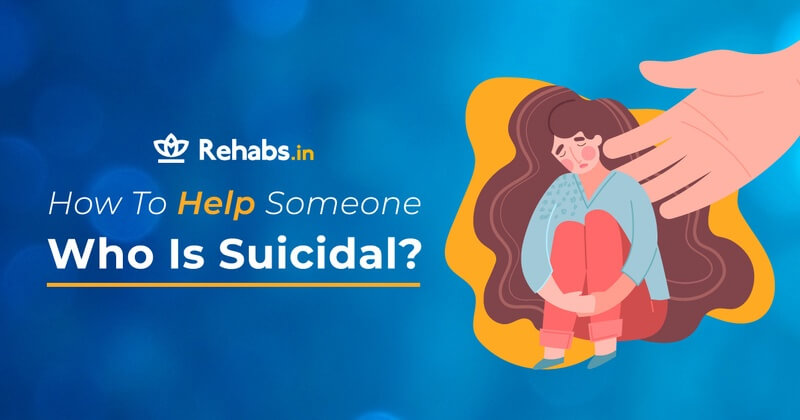How To Help Someone Who Is Suicidal?

The following blog has been reviewed by a Psychologist. If you are reading the blog on a mobile phone, you can see the reviewer’s profile at the end of the blog. Please see our editorial policy here.
If you or someone in your friends and family experience suicidal thoughts confidential help is available. Visit the Suicide Help page for more information.
Help can be given to those who accept that there is something wrong and ask for it.
Suicide is not just a condition; it is a disease that slowly creeps into a person’s mind making them want to end life even during their success at work, home, or in general. The frequency of suicidal thoughts can vary depending upon the severity of existing mental health problems.
A person can be excelling at work, in relationships, or managing home. They may have a fit body or a good diet or no chaos at home and maybe receiving many laurels or appreciations for their work everywhere.
The same person can also have a ‘perfect life’ or at least the idea that fits society’s ‘norms.’ But somewhere, the thought of ending one’s life still crosses their mind.
The reasons can be many or few. It can also be an accumulation of events that may have occurred over the years or a traumatic present.
If this is happening to someone you know, they need immediate help.
Understanding Suicide
National Crime Records Bureau (NCRB) says 1 million people commit suicide in India each year. The number of suicides had risen by 3.4% in the year 2019, taking the total to 1,39,123.
The number of suicide cases is intimidating and should stir us to think about its various reasons or causes.
The existing stigma around mental health conditions in our society refrains people from talking about it. Many driving factors lead a person to commit suicide. It is difficult for those who are not in the grips of severe mental health conditions to understand how much pain a person goes through before taking the step to end life.
For those who do take this step, they see no other reason to stay alive. Suicide becomes a desperate attempt to free themselves from the unbearable pain and misery. The feeling of hopelessness, isolation, and contempt finds a way for relief that is only seen by ending life.
They would not have been standing at the edge if only someone had heard their silent cries or screams. A person before committing suicide does take help from others, asking directly or indirectly. But when they see it failing, they become compelled to take such a nerve-wracking step. Some individuals prefer to plan their suicide in isolation as they feel nobody would understand their pain or the fear of embaressment. Individuals with an introverted personality may keep everything to themselves including the process of ending their lives as they are used to doing everything is isolation.
While all the suicidal people feel if there was another option to end their misery, they fail to see it as society has deep roots in multiple misconceptions.
Myth 1: People Killing Themselves Are Crazy
People who commit suicide suffer from severe mental health issues that are mostly difficult to diagnose or understand. They are neither psychotic nor insane. Such people have suffered a lot emotionally as they can be grief-stricken, depressed and in extreme emotional pain. A person suffering from such mental health problems and having suicidal thoughts is not crazy. They either need professional help or feel the need to be heard.
Myth 2: A Person Talking About Suicide Will Never Actually Attempt It
People who attempt suicide give several clues or even directly mention it before taking the step in real. They may or may not say things casually or jokingly like I can’t see any way out, or I wish to leave everything behind and elope, or you will know when I will be gone, or there is no hope.
If anyone talks about such things or even mentions it a few times, it must be considered a warning sign and given the required help. One must show them light and the hope to see far beyond their eyesight.
Myth 3: Talking About Suicide Can Give People an Idea
Talking about suicide can never give anyone the idea to attempt it in real life; instead, it is helpful. Honestly talking about suicidal thoughts in the open may help save lives, at least one if not all. It should be practiced by every individual irrespective of their mental health state.
Warning Signs
One must take every suicidal thought seriously because it is not only a warning sign but a cry for help.
Either one or many of these warning signs are visible in the person having suicidal thoughts, which should be enough for you to start a conversation:
- A person talking about suicide or self-harm
- Paying undue attention to conversations around death or continuously thinking about it
- Feeling hopeless, trapped, or helpless
- Self-hatred or feeling unworthy, or ashamed
- Making arrangements that can be seen as a sign of goodbyes like creating a will, giving away most prized possessions, or arranging things for friends and family for after
- Extreme social isolation
- Indulging in self-destructive behaviour like consuming incessant drugs or reckless driving
- Unanticipated calmness or happiness after being depressed for an extended period
Suicide Prevention: Choose to Stay
A person can show many signs of suicide before committing. When the signals are visible enough, anyone can wonder if they should initiate the conversation, or will that person get hurt or move away? It is only natural to feel such a rush of emotions, but if talks are not initiated today or soon, there may be consequences for it.
Depression is highly misunderstood, for it can not be easily comprehended like any other major disease, say cancer or diabetes. One major source of confusion is having depression and feeling depressed. Almost everyone feels depressed or down from time to time when a person loses a job or scores fewer grades or has a complicated or failed relationship . Sometimes, even a rainy or cloudy day can set in depressed feelings. When circumstances change, the same person feels better or uplifted.
However, it is not the case with clinical depression. It won’t go away even when the circumstances change for a person. Clinical depression lingers for an extended period and affects the ability to work, play and love. Sometimes, the consequences of depression are worse for a person that they are compelled to commit suicide.
This can be changed by SHATTERING THE SILENCE.
Start the Conversation
No matter how hard it is, start the conversation, for it may save someone’s life. Maybe someone can help, or perhaps they just want one person to listen to them without judgments, so it heals.
The pain may not instantly go away, but it can be the start of it. It can be the point where they end up choosing to stay and live a little longer rather than ending life.
Offer Help and Support
Choosing to stay is hard for a suicidal person but asking for help to live a little longer is harder. If you or someone else you know is going through such a crisis and notice the warning signs, get help as soon as possible. It might save a life.
If they could not see that tomorrow will get better, make them believe in love, hope, and faith.
Get professional help. Let doctors or mental health practitioners do the job of getting them out of this difficult time.
They will soon realise that somewhere between their dark but beautiful existence and the moments lived in the past, they forgot that they don’t have to stay alone. The pain does not entirely go away – it takes time to heal completely.
It takes endless conversations, medical help from professionals, and sometimes involves medications – but they don’t have to do this alone. There must be a follow-up with them at every step of the process of healing and encouraging a positive lifestyle.
If your loved one has suicidal thoughts or mental health issues, get professional help, and support. Let them CHOOSE TO STAY.
What Should You Do While Talking To A Suicidal Person?
- Let the person know they are loved, cared for, and have faith in them.
- Listen to their feelings or opinions on certain things. Do not argue at any given point.
- Be sympathetic rather than being judgemental; otherwise, it can make them lose hope sooner.
- Reassure them that every kind of help is available at any time.
- Do not joke about their condition when they share their feelings. Suicide is a sensitive topic, especially for a person who is thinking of attempting it.
- Do not blame anyone for their condition and offer ways to ‘fix’ it.
- PROMISE CONFIDENTIALITY
- Respond quickly in this crisis if they have an execution plan.
- DO NOT LEAVE THEM ALONE
If suicide attempts seem imminent, call your local mental health center or national emergency helpline (108). If possible, take that person to the nearest emergency room or a psychiatrist. Remove sharp objects from the vicinity or that can cause harm to any living being. Do not keep any potential lethal weapons or things that can cause injury.
Believe that person and give them hope – the hope they have lost or stopped seeing for they want to end life.
Believe their story. Listen. Show them your love and care.
Make them see the light at the end of the tunnel that they cannot see.














